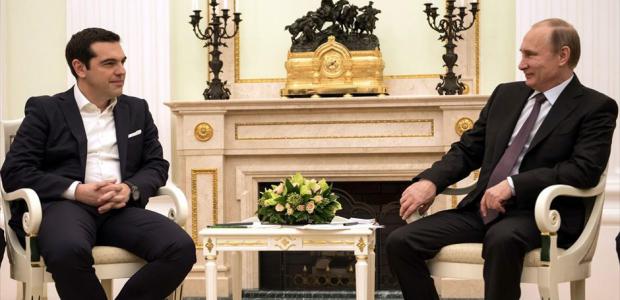Greece is prepared to examine the financing details concerning the development of the local segment of Turkish Stream, Russia’s latest natural gas pipeline plan for supply to the continent, but will act in compliance with EU regulations and only following agreement with fellow EU partners, Prime Minister Alexis Tsipras told Russian President Vladimir Putting during a meeting today in Moscow between the two heads of state.
Russia’s plan for Turkish Stream entails bypassing Ukraine and reaching the Greek-Turkish border area for supply into the EU. The prospective infrastructure project has emerged as Russia’s alternate proposal to South Stream, which would have crossed the Black Sea to Bulgaria. South Stream was shelved after Russia refused to accept EU law as the project’s dominant legal framework, which adds particular weight to the Greek prime minister’s reference to EU law as a guiding force in the country’s pipeline dealings with Russia.
Both leaders remained subdued in their references concerning prospective bilateral energy ties between the two nations, opting to present the matter as one involving Russia and the EU as a whole, as well as Greece’s obligations as an EU member.
By refraining from making any ambitious remarks on Turkish Stream, the Greek government has opted to place emphasis on making the right preparations that can lead to the project’s feasibility, rather than deliver big words and no eventual action, as has been the case in the past.
The Greek prime minister noted that the topics discussed included promoting energy cooperation between the two countries, as well as strengthening Greece’s role as an energy hub in Europe.
Tsipras pointed out that Greek-Russian ties have been lethargic in recent years, while adding that the time was now ripe to reinvigorate activity between the two nations.
The Russian president confirmed that the pipeline plan for gas transmission to Europe was discussed with the Greek leader, while adding that Greece will serve as a key distribution center in the project. Putin reminded that two-thirds of Greece’s natural gas needs are covered by Russia.
An effort will be made to revive bilateral trade between the two countries to levels achieved prior to the enforcement of international sanctions, Putin noted.
Responding to a journalist’s question on whether specific details on Turkish Stream were discussed, Putin said extensive discussion took place on Greece’s involvement in the pipeline project, adding that it was up to Greece to examine the matter in cooperation with its EU partners.
The Russian president noted that Greece’s participation in Turkish Stream promises to elevate the country’s geopolitical role and generate significant revenues for the state’s coffers.
Tsipras intervened to make clear that the pipeline’s Turkish Stream title would be valid only for its Turkish segment and named otherwise for its section running through Greek territory.





